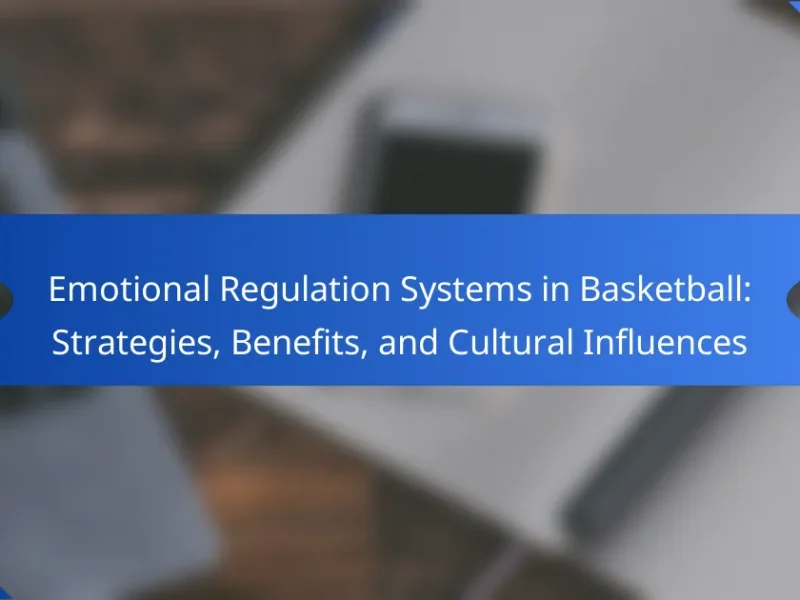Effective emotional regulation practices in athletics can significantly enhance performance and mental well-being. This article explores key techniques such as mindfulness, cognitive restructuring, and emotional awareness. It also examines cross-cultural variations in these practices and their impact on athletic outcomes. Understanding these diverse approaches can help athletes improve focus, resilience, and overall team dynamics.

What are the core emotional regulation practices in athletics?
Emotional regulation practices in athletics include techniques that enhance performance and well-being. Key practices involve mindfulness, cognitive restructuring, and emotional awareness.
Mindfulness helps athletes maintain focus and reduce anxiety during competition. Cognitive restructuring allows athletes to reframe negative thoughts, fostering a positive mindset. Emotional awareness aids in recognizing and managing feelings, leading to better decision-making.
Cross-cultural comparisons reveal variations in these practices. For instance, Eastern cultures may emphasize mindfulness more, while Western cultures might focus on cognitive strategies. This diversity influences athletes’ emotional regulation approaches, impacting their overall performance.
Research shows that effective emotional regulation correlates with improved athletic outcomes, including enhanced focus and resilience under pressure.
How do these practices vary across different cultures?
Emotional regulation practices in athletics vary significantly across cultures, influenced by social norms and values. For example, Eastern cultures often emphasize collective emotional expression, while Western cultures may prioritize individual emotional management. These differences impact athletes’ performance, as culturally aligned practices can enhance focus and resilience. Additionally, unique attributes like the use of mindfulness in Asian sports versus goal-oriented approaches in Western sports highlight rare cultural distinctions. Understanding these variations can lead to more effective training methods tailored to athletes’ cultural backgrounds.
What role does emotional regulation play in athletic performance?
Emotional regulation significantly enhances athletic performance by improving focus and reducing anxiety. Effective emotional regulation strategies, such as mindfulness and cognitive restructuring, allow athletes to maintain composure under pressure. Cross-cultural studies show that athletes from different backgrounds employ diverse emotional regulation techniques, impacting their performance outcomes. For instance, athletes in collectivist cultures often emphasize team cohesion and emotional support, while those in individualistic cultures may prioritize personal accountability and self-motivation. This variability highlights the unique attributes of emotional regulation practices across cultures and their rare impacts on performance.

What are the universal attributes of emotional regulation practices in athletics?
Emotional regulation practices in athletics share universal attributes that enhance performance and mental resilience. Common attributes include self-awareness, emotional control, coping strategies, and mindfulness techniques. These practices foster focus, reduce anxiety, and improve overall athlete well-being. Cross-cultural comparisons reveal variations in the application of these practices, yet the core attributes remain consistent across diverse athletic environments.
Which techniques are commonly used by athletes worldwide?
Athletes worldwide commonly use techniques such as mindfulness, visualization, breathing exercises, and self-talk to regulate emotions. These practices enhance focus, reduce anxiety, and improve overall performance. Cross-cultural studies show varying preferences for these techniques based on cultural backgrounds and sports disciplines. For example, Eastern athletes may favor mindfulness, while Western athletes often emphasize visualization.
How do emotional regulation practices influence mental resilience?
Emotional regulation practices significantly enhance mental resilience by fostering adaptive coping mechanisms. Athletes who employ techniques like mindfulness and cognitive restructuring demonstrate increased focus and stress management. Cross-cultural studies reveal that these practices vary in acceptance and application, impacting performance outcomes. For instance, Eastern cultures often emphasize meditation, while Western approaches may favor cognitive-behavioral strategies. These differences highlight unique attributes of emotional regulation, influencing athletes’ resilience across diverse contexts.

What unique attributes distinguish emotional regulation practices in specific cultures?
Emotional regulation practices in athletics vary significantly across cultures, shaped by unique attributes such as societal norms and values. For instance, Eastern cultures often emphasize collective emotional control, promoting harmony and group cohesion, while Western cultures may prioritize individual expression and assertiveness. These differences can influence athletes’ performance, as cultural expectations affect coping strategies and stress management techniques. Additionally, rare attributes like the integration of traditional practices, such as mindfulness in Asian cultures, can enhance emotional regulation, ultimately impacting athletic outcomes.
How do cultural beliefs impact emotional expression in sports?
Cultural beliefs significantly shape emotional expression in sports, influencing athletes’ performance and interactions. For instance, collectivist cultures often promote emotional restraint, fostering team cohesion, while individualistic cultures encourage personal emotional expression, enhancing individual performance. These differences affect how athletes regulate emotions during competition, impacting stress management and resilience. Understanding these dynamics can lead to tailored coaching strategies that respect cultural contexts, ultimately improving athletic outcomes.
What are the unique emotional regulation strategies used by athletes in different regions?
Athletes employ unique emotional regulation strategies influenced by their cultural backgrounds. For instance, Eastern athletes may focus on mindfulness and meditation, while Western athletes often emphasize goal-setting and visualization techniques. These strategies impact performance by enhancing focus and resilience under pressure. Cultural context shapes the effectiveness of these practices, with collectivist cultures promoting team cohesion and individualistic cultures fostering personal achievement. Understanding these differences can improve training and support for athletes across various regions.

What rare attributes can be observed in emotional regulation practices?
Rare attributes in emotional regulation practices within athletics include culturally specific techniques, adaptive coping strategies, and unique performance-enhancing rituals. These practices may vary significantly across different cultures, reflecting distinct values and beliefs that shape emotional responses. For instance, some cultures emphasize collective emotional expression, while others focus on individual resilience. Additionally, the integration of mindfulness in certain traditions showcases a unique approach to emotional regulation that enhances athletes’ focus and stress management. Such rare attributes can profoundly impact performance, leading to varied outcomes based on cultural context.
What uncommon techniques have shown effectiveness in niche athletic communities?
Uncommon techniques such as mindfulness meditation, visualization, and breath control have shown effectiveness in niche athletic communities. These practices enhance emotional regulation, improve focus, and reduce anxiety, contributing to better performance outcomes. For example, athletes in martial arts often utilize visualization to mentally rehearse techniques, leading to improved execution during competitions. Similarly, endurance athletes may employ breath control techniques to manage stress and maintain optimal performance levels. The integration of these practices varies across cultures, highlighting unique approaches to emotional regulation in sports.
How do historical events shape emotional regulation practices in sports?
Historical events significantly influence emotional regulation practices in sports by shaping cultural attitudes and strategies. For instance, the rise of sports psychology in the late 20th century introduced methods like visualization and mindfulness that athletes use today. Different cultures have unique emotional expression norms, impacting how athletes manage stress and perform under pressure. In Japan, for example, the concept of “wa” emphasizes harmony and collective emotional regulation, while Western cultures often prioritize individual expression. These historical and cultural contexts create diverse practices that enhance performance and resilience in athletics.

What are the implications of emotional regulation practices on team dynamics?
Emotional regulation practices positively influence team dynamics by enhancing communication and collaboration. These practices foster a supportive environment where athletes feel safe expressing emotions. Improved emotional awareness leads to better conflict resolution and stronger interpersonal relationships. Cross-cultural comparisons reveal that teams adopting emotional regulation strategies experience increased cohesion and performance.
How do emotional regulation practices affect leadership in sports teams?
Emotional regulation practices significantly enhance leadership effectiveness in sports teams. Leaders who manage their emotions foster a positive team environment, promoting cohesion and performance. Research indicates that emotional intelligence in leadership correlates with improved team dynamics and success. For example, leaders who practice mindfulness demonstrate higher resilience, which influences their team’s motivation and focus. This unique attribute of emotional regulation not only benefits individual players but also strengthens overall team performance.
What are the challenges faced by athletes in regulating emotions during competitions?
Athletes face significant challenges in regulating emotions during competitions, impacting performance. High-pressure situations often lead to anxiety and stress, which can hinder focus and decision-making. Cultural differences influence emotional expression and coping strategies, creating unique challenges for athletes from diverse backgrounds. For instance, some cultures may prioritize emotional restraint, while others encourage open expression, affecting how athletes manage their feelings. Additionally, the pressure to succeed can lead to fear of failure, further complicating emotional regulation. Understanding these factors is essential for developing effective mental training programs tailored to individual and cultural needs.

What best practices can athletes adopt for effective emotional regulation?
Athletes can adopt several best practices for effective emotional regulation, including mindfulness techniques, cognitive restructuring, and social support. Mindfulness practices, such as meditation and breathing exercises, enhance self-awareness and reduce anxiety. Cognitive restructuring helps athletes reframe negative thoughts into positive ones, improving resilience. Social support from coaches and teammates fosters a sense of belonging, promoting emotional stability. Additionally, regular physical activity itself serves as a natural mood enhancer, contributing to overall emotional well-being.
What common mistakes should athletes avoid when implementing these practices?
Athletes should avoid common mistakes such as neglecting individual emotional needs, failing to adapt practices across cultures, and overlooking the importance of consistency. Ignoring these factors can hinder performance and emotional well-being. Additionally, not seeking feedback from coaches or peers may limit growth in emotional regulation techniques.
How can coaches support athletes in developing emotional regulation skills?
Coaches can support athletes in developing emotional regulation skills by implementing targeted strategies. These include fostering a supportive environment, teaching coping mechanisms, and encouraging mindfulness practices.
Coaches should provide consistent feedback, helping athletes recognize their emotional triggers. They can introduce techniques such as deep breathing and visualization to enhance emotional control. Additionally, promoting open communication allows athletes to express their feelings and challenges, facilitating better emotional understanding.
Cross-cultural comparisons reveal that different coaching styles influence emotional regulation practices. For instance, collectivist cultures may emphasize team cohesion, while individualistic cultures focus on personal accountability. Understanding these cultural nuances enables coaches to tailor their approaches effectively.
Research indicates that improved emotional regulation correlates with enhanced athletic performance, leading to better focus and resilience during competition. By prioritizing emotional skills, coaches contribute to the overall development of athletes, both on and off the field.
What expert insights can enhance understanding of emotional regulation in athletics?
Expert insights on emotional regulation in athletics reveal that cultural differences significantly influence athletes’ strategies and outcomes. For instance, athletes from collectivist cultures often emphasize group harmony and emotional support, while individualistic cultures may prioritize personal resilience and self-regulation.
Research indicates that emotional regulation practices can enhance performance by reducing anxiety and improving focus. Athletes who utilize techniques such as mindfulness and cognitive restructuring show marked improvements in competitive settings.
Additionally, understanding the unique attributes of emotional responses across different sports can inform tailored training programs. For example, team sports may benefit from group-based emotional regulation strategies, whereas individual sports might focus on personal techniques.
In conclusion, integrating cross-cultural insights into emotional regulation practices can optimize athletic performance and mental well-being.


